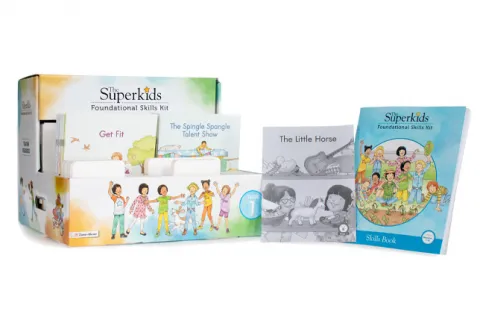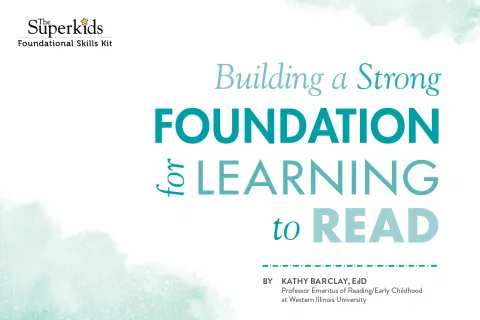
North East Independent School District Case Study: Superkids Delivers Foundational Skills
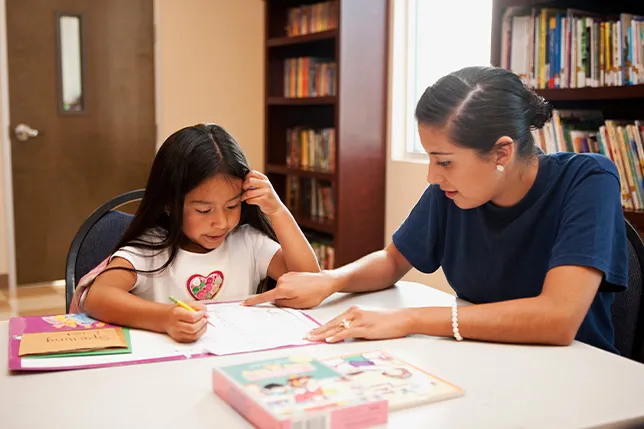
A Confluence of Events
Implementing new state science-based reading requirements—and adopting The Superkids Foundational Skills Kit—in the midst of the COVID-19 pandemic challenged literacy instructors and teachers in the North East Independent School District in San Antonio. They—and their students—developed skills and techniques to overcome these challenges to thrive.
After the district switched to the NWEA MAP Growth assessment tool in 2019, leaders noted that 2020 mid-year foundational skills scores were well below their hopes. The results troubled Diana Palacios, then newly appointed assistant director of English Language Arts and Reading (ELAR). “The number of students in third grade not reading at a proficient level was concerning.”
Palacios and her literacy colleagues quickly determined their target: K–2 literacy instruction. At the same time, Texas House Bill 3, in 2021, established Texas Reading Academies; these stipulated using science-based reading instruction and activities. They also required explicit phonics instruction starting in kindergarten.
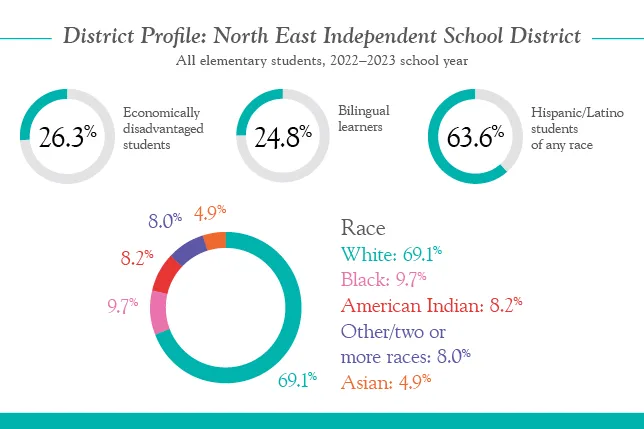
When Palacios and her team learned about the Reading Academies’ requirements, they realized that explicit and systematic phonics instruction was absent from the district’s traditional reading program. Unexpectedly, the COVID-19 pandemic helped them discover The Superkids Foundational Skills Kit just as schools closed.
“I came across the Superkids decodable books online during the pandemic in March 2020,” explains Julie Blackstone, ELAR specialist. “I found ‘The Attic’ and thought, ‘This decodable is so rich; it’s so great.’”
Palacios agrees that Superkids’ decodables drew her in because they were rich and robust compared to other programs. The Superkids Foundational Skills Kit resources arrived in August 2020.
“What made us lean in to Superkids was the quality of the decodables. Other programs had decodable text, but not rich and robust like Superkids.”
— Diana Palacios, Assistant Director ELAR
Clear Support for Impactful Instruction
To dive deeper during continuing COVID restrictions, NEISD literacy leaders created videos to help teachers understand the Superkids resources. “In the most hectic of times,” literacy specialist Tamera Barba explains, “Superkids was a resource that laid everything out, everything your kids needed.”
Barba was a kindergarten teacher during the first year of implementation, using the team’s virtual resources to understand and implement the program. “Teachers now have had time to scratch the surface, and then they had another year to go deeper,” she says. “And now, year three, we really see teachers understanding how impactful the program is and finding ways they can make it their own.”
To roll out the kit, “we started with our Title I campuses,” Palacios explains. “We looked at their data from last year, and the ones who were using Superkids with fidelity, their kids were in a good place.” District administration leaders also noticed.
Palacios was invited to show district principal groups the assessment results. In the first small group, she “talked about the importance of making sure that our first graders were leaving first grade reading and how Superkids addressed all those pieces,” she says.
Even during the first challenging year, teachers witnessed and measured tangible student growth with Superkids. By implementation year three, kindergarten results on the phonics portion of the NWEA’s MAP Growth assessment climbed by 10 percentage points in the “exceeds expectations” category.
“Superkids’ ease of usability is great. Teachers can pick it up and just start with the Teacher’s Guide and implement it. That’s extremely beneficial for a district that’s as large as ours.”
— Julie Blackstone, ELAR Specialist
Seeing tangible, quantifiable results meant principals talked to each other about Superkids and asked Palacios to describe Superkids-centered classrooms: which Superkids materials they should see in their buildings, what posters should appear on classroom walls, and how to listen for Superkids songs.
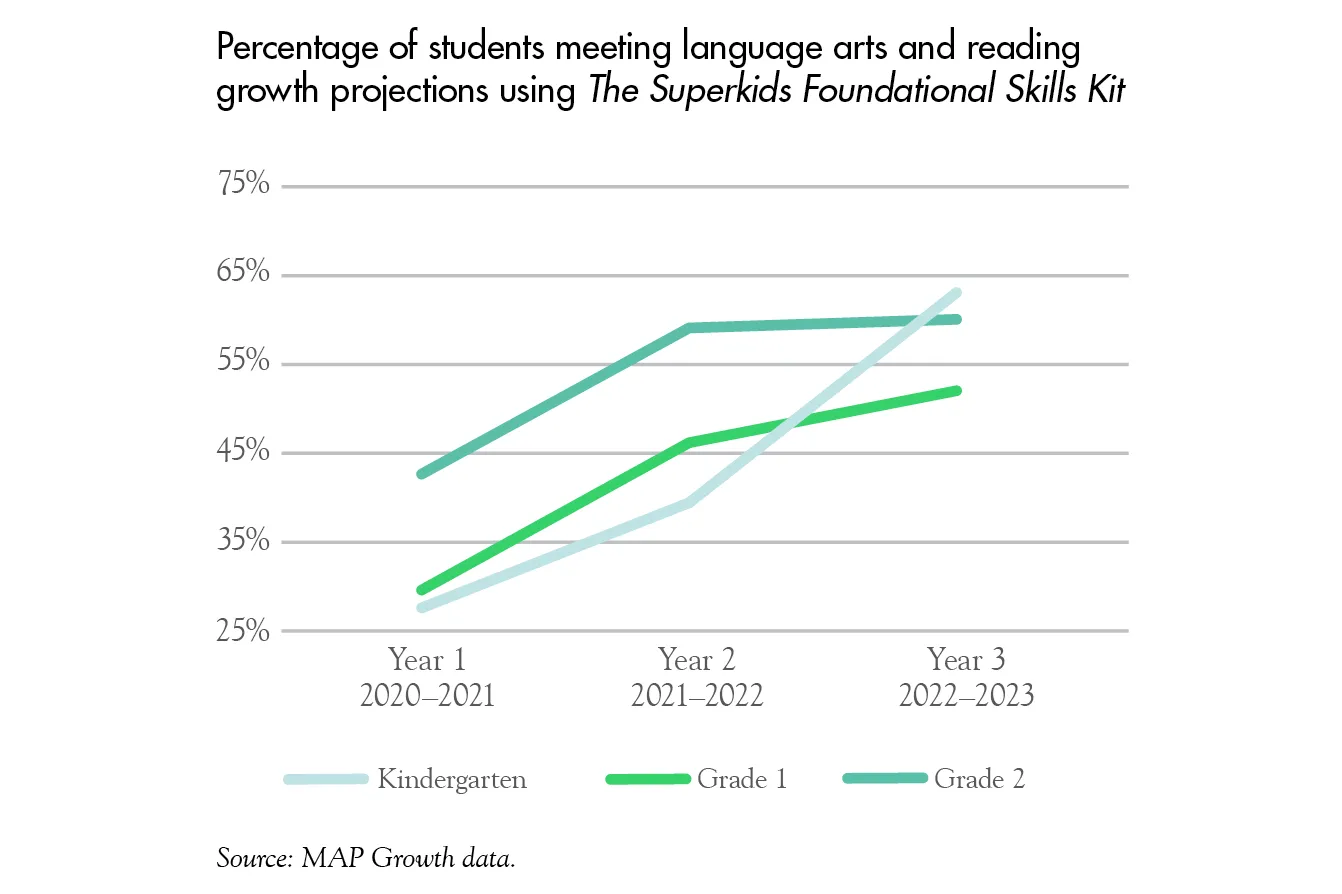
Finding Motivation by Seeing Results
Because of its rich oral language component, The Superkids Foundational Skills Kit strengthens and boosts NEISD’s reading program, Palacios explains. “But we didn’t anticipate at all how much the kids love Superkids.”
The literacy leaders agree that other phonics programs’ text was “dry.” They agree that following the Superkids characters’ adventures bolsters their students’ motivation that spills into a love of reading, even in a foundational skills program.
“The kids get enamored of the Superkids characters while they’re learning their foundational skills like never before.”
— Tamera Barba, ELAR Specialist
Palacios explains the deep motivation Superkids decodable books provide. “Joy is something we did not anticipate. Kids are learning the skills they have to learn, and they’re learning them joyfully.”
You May Also Like
